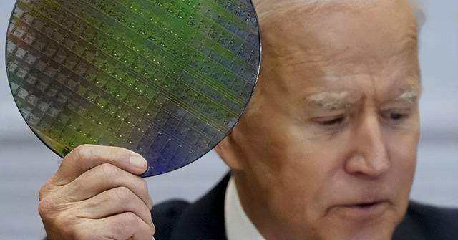
The latest U.S. Senate draft shows that the United States will ease proposed restrictions on the use of Chinese-made chips by the government and its contractors.
A new proposal introduced by the U.S. Senate on Dec. 1 no longer prohibits the government and its contractors from "using" the chips they target. The compliance deadline would also be extended to five years from the immediate effect or two-year buffer proposed in September's amendment to the National Defense Authorization Act. The latest draft also narrows the scope of the restrictions, stating they apply only to projects of government "critical systems," such as telecommunications or information networks used for intelligence activities, military command or weapons.
Lawmakers are expected to announce the final wording of the new proposal later this week, which could include the revised measures from the draft.
The report pointed out that the restrictions were eased because trade groups such as the American Chamber of Commerce pointed out that the United States' measures to curb China's technological development drove up their costs. This is the latest example of the US industry's proposal to weaken and suppress China's technological development. The trade groups said in a letter last month that because the chips manufactured by SMIC are used in a wide range of applications and most companies do not label the manufacturers of the chips they use, companies need to determine the number of substances contained in a large number of electronic products. Whether the chip is manufactured by SMIC is costly and difficult. Business groups argue that requiring companies to take on such tasks does not help U.S. national security. Both U.S. telecommunications and defense industry groups signed the letter.
The office of hawkish Sen. Democratic Leader Schumer, SMIC, Yangtze Memory Technology, Changxin Memory Technology and the U.S. Chamber of Commerce did not respond to requests for comment.
Schumer and Republican Congressman Cornyn announced measures in the amendment to the National Defense Authorization Act in September this year, requiring US federal agencies and their contractors to stop using chips produced by Chinese chip leaders SMIC, Yangtze Memory Technology, and Changxin Memory Technology. chip.
A spokesman for Corning said the five-year implementation deadline in the new proposal was designed to coincide with the passage of the Chip Act earlier this year, which provided $52 billion in grants for chipmakers to expand their presence in the U.S. Business.
The Chinese embassy in Washington said of the new proposal that it "resolutely" opposed the inclusion of negative remarks about China in the legislation, and the letter from the U.S. Chamber of Commerce showed that it was not in anyone's interest to disrupt and damage global industrial supply chains at will.


